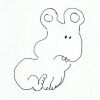🎤 Interview with nebu soku
2024年 2月 17日
We had the chance to pick the brain of thinky puzzler nebu soku! We talked about designing puzzle mechanics and levels using PuzzleScript and PICO-8, and about working on their first full-fledged release, Magicube!
English (translated)
Translated by Renkon
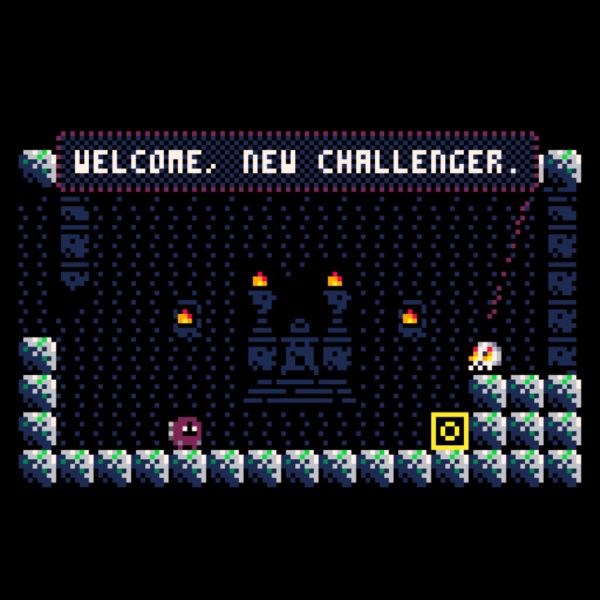
(2023) Magicube
# Please tell us a little bit about yourself.
I’m a normal person who has lost their way. From my corner of the world, I do casual part-time work while making and playing puzzle games. Recently I’ve been looking forward to the days when I work overtime so that I can treat myself to a luxurious dinner afterwards.
# How did you get started making games?
I’ve always loved to express my ideas, whether by drawing manga, playing the guitar, or taking pictures, and I have never been able to remain a passive onlooker in things that interest me. I am aware that I don’t have the aptitude to be a programmer so I thought I wouldn’t be able to develop games. But a few years ago, I started making puzzles when I learned about an easy-to-use game engine for beginners called PuzzleScript. The rest is history.
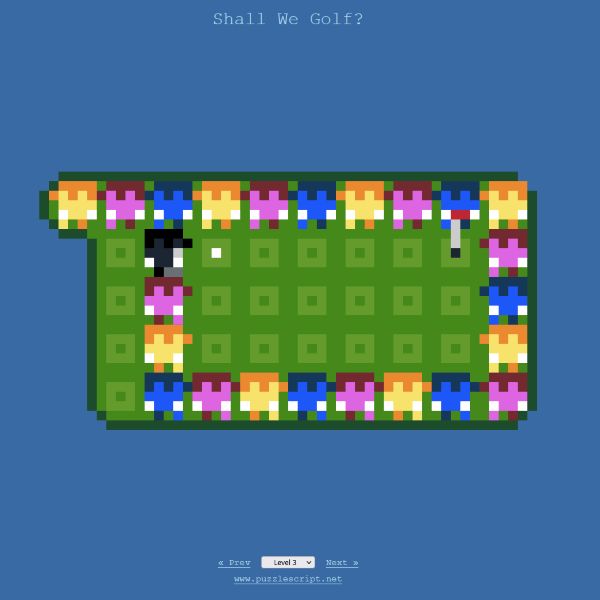
(2021) みんなでGOLF! (Shall We Golf?)
# Can you tell us about some of your favorite games and genres?
Among the games I played as a child, PaRappa the Rapper is my favorite. The rhythm genre was still pretty new, but I was especially taken aback by its bold art style that took advantage of emerging 3D technology. Growing up, I was not allowed to buy games, so back then, I could only play games here and there at friends’ houses. But I couldn’t forget those fun memories even after I became an adult, and continued playing those games and even their sequels again and again. I still love listening to the soundtrack.
I also loved moon and other games made by Love-de-lic. When I think about it now, these were how I got started with thinky games. The first game I played was GiFTPiA: searching for puzzles that are scattered around, observing the diorama-like world, thinking about and being charmed by the unique ideas, and looking for and playing every game I could find that was just like it. Among them, Endonesia is one of those games that I wish I could forget so that I can play it again completely fresh. (I happened to see one of the answers, too bad!).
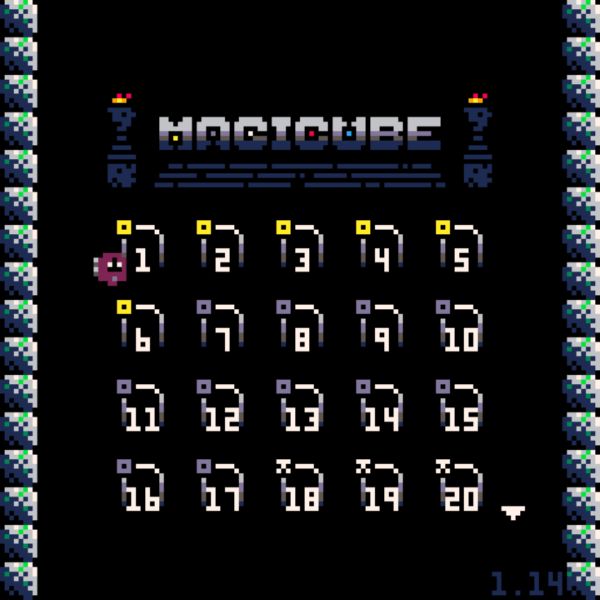
# Please tell us about Magicube!
It is a simple 2D puzzle game. To quote some celebrities:
- Aliensrock: “Even level 4 will destroy you.”
- Alan Hazelden: “It’s one of those ‘level 1 is hard, level 2 is impossible’ games.”
- Jonathan Blow: “What an awful first level.”
…apparently.
# Can you tell us about the process of making Magicube? Was it different from the way you approached making your other games?
Whether I was asleep or awake, I thought about puzzles all day every day.
Thankfully, someone contacted me when I first released the demo, and for more than a year they helped out as a tester. I added levels and had them play it, then modified the solutions and had them play some more. Of course, I appreciated their feedback, but more than that, having someone who was always looking forward to the next puzzle I made was great motivation. Thank you so much, qwaffles!
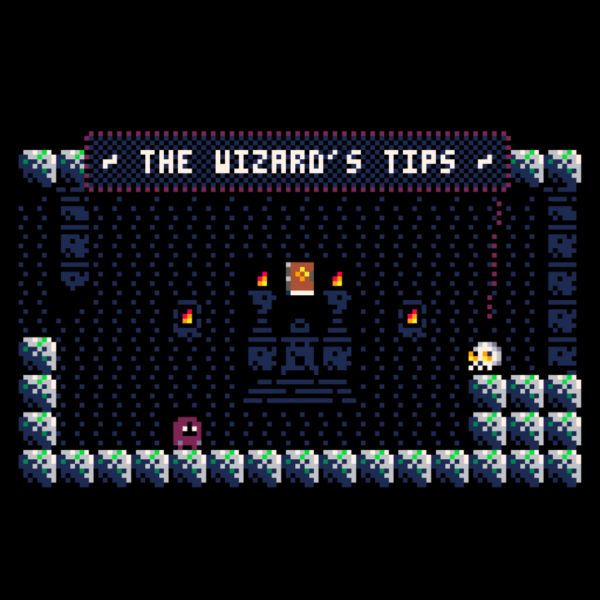
# In Magicube, it’s fascinating how each stage feels so different. How did you come up with the puzzles? What circumstances led you to think of these levels and mechanics?
How did I come up with these puzzles, indeed? (laughs) Most of the puzzle-making process was a never-ending staring contest taking place inside of my head. Especially in my case, I rely on the know-how I picked up from actually playing with puzzles, so it is very easy to get off track, and it is difficult to put this process into words.
One of my beliefs is that puzzles are the stage upon which ideas are conveyed to the player. My policy of designing puzzles is that the first idea that emerges and shines should be centered like the leading character on stage, and from there, I can adjust the degree of difficulty that leads to the end result.
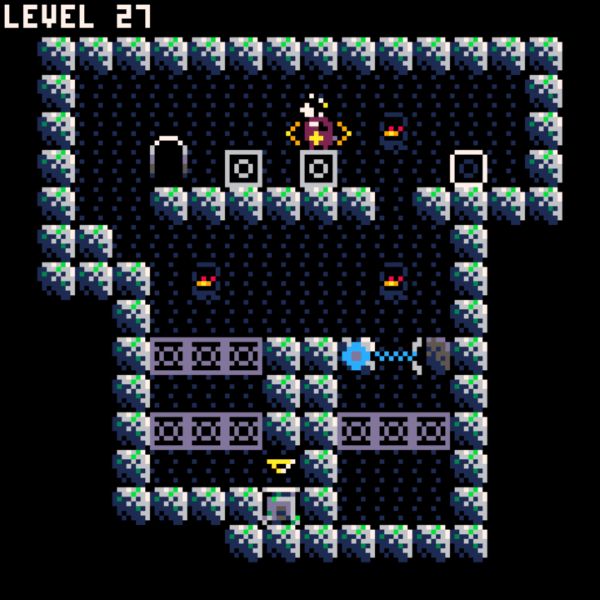
# What was your greatest influence when making Magicube?
I chose to make a platformer because of my admiration for Recursed(※1). The idea for the core mechanic of Magicube was (and this may come as a surprise) from Portal(※2). To be more accurate, there is a technique from the Portal mods and custom levels that utilize the cube’s reset function, which I first experienced in Portal Stories: Mel(※3), and it immediately grew on me.
My first idea was that there was a grid over the screen, and clicking any of the spaces would let the player place blocks wherever they wanted to solve puzzles. But as you’d imagine, the player had too much freedom. But what if only one block could be placed at a time?
The more I let this idea stew in my head, the more I realized that I could use this concept of disappearing blocks, and I thought the puzzles could be even more interesting. For that reason, I think of the core mechanic in Magicube not as the ability to create blocks, but the ability to make blocks disappear.
※1: One of the most mind-bending puzzle games out there. Play it!
※2: One of the most famous puzzle games in history. Play it!
※3: One of the best fan-made games. Play it!
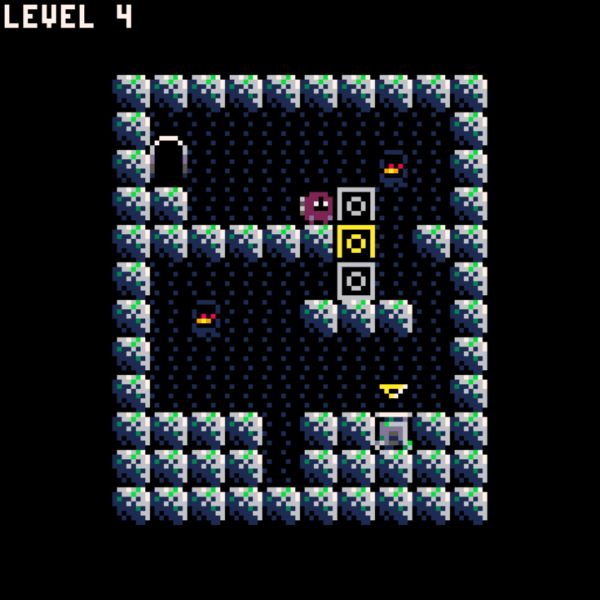
# What was the most challenging part of making Magicube?
Everything was a challenge! It was my first long-term development project, my first full-scale game, and above all else, my previous experience taught me how difficult it would be to create quality puzzles on my own. I set out several major goals for myself in order to complete the game, and used those points to keep me motivated.
Don’t be greedy: Although I wanted to focus on the presentation, I thought that the quality of the puzzles should be the top priority, and I would have to get to the rest whenever I could afford to.
Spend a year working on this: It’s not just that I thought it would take a year, but I determined that it would take at least a year to make a good puzzle game. In actuality, it took a year and a half.
The best 50 puzzles are better than 100 okay puzzles: I considered my own abilities and decided on this. In fact, it took me a year and a half to design fifty puzzle levels. (Only one level was made by my tester!)
Make a demo and get public feedback: I had never done the things that game developers usually do so I did not know how to solicit feedback, so I decided to use itch.io to release a demo to the public and held an open beta. Some YouTubers made videos of them playing the game, which was very helpful feedback.
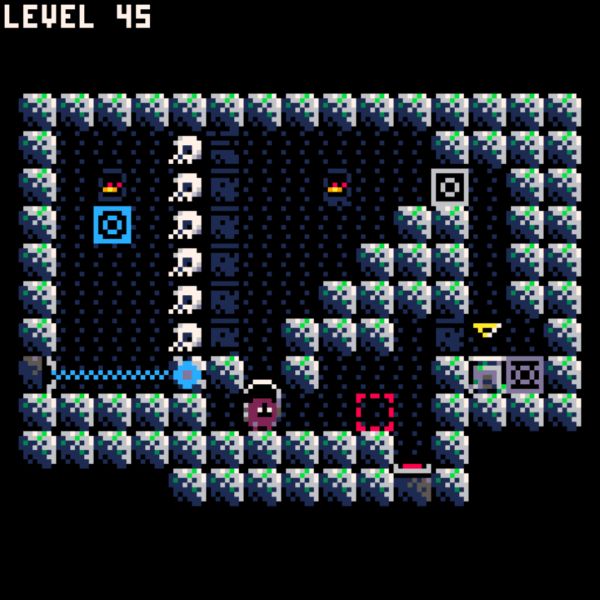
# Magicube has a high level of difficulty, yet I thought that was its charm. Is there anything you did in particular to make it so levels can’t just be cleared by chance?
When creating puzzles, especially the ones that gave me the most trouble, I did my best to keep the player’s point of view in mind, and to design puzzles that are easy to face down, even if they are difficult.
To tell you the truth, I used to think that beauty was about leaving out all the unnecessary parts, and I didn’t care about difficulty or the stress the player might feel. Baba Is You and Stephen’s Sausage Roll(※4) made me reflect on my self-complacency. I replayed both of these games while working on Magicube, and I learned many things that I could only realize from the perspective of a creator. which led me to rethink many of the levels that I had already implemented.
If you found the difficulty in Magicube beautiful, it is only thanks to titles like Baba Is You, Sausage Roll, and the passionate advice from our testers. Puzzles are fun because they torment you, but being tormented is not necessarily fun, so I think that is the difficult part of making puzzles.
※4: Both are legendary puzzle games that set a great standard of excellence for the design philosophy of later puzzle games. Play them!
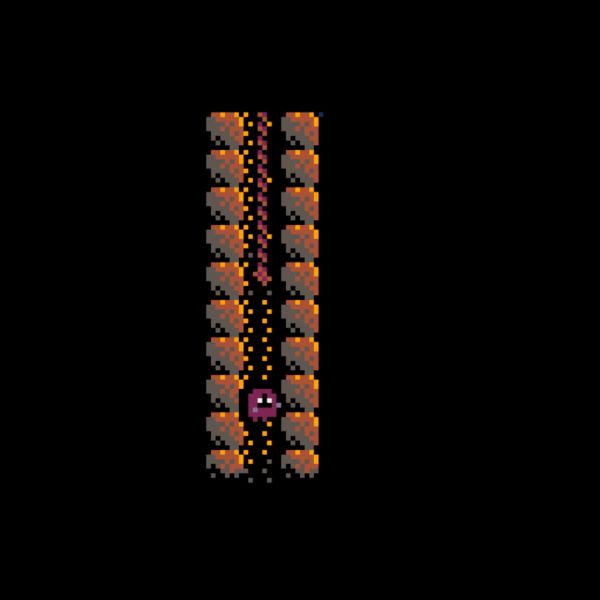
# Do you have any advice for people who can’t make it through Magicube?
If you encounter a puzzle that you cannot solve, try closing the screen.
This is just speaking from personal experience, but I find that while I am visually facing down a puzzle, my perspective narrows and I get stuck on the wrong details that are hard to shake off. When I try to picture it in my mind, I can see the whole range of possibilities open to me, and I have time to observe it from multiple angles.
The same applies to making puzzles as well, especially when I find a fatal flaw or contradiction. Rather than continue to glare at the editor, I think it is better to come up with solutions while taking a walk.
It’s often said that you can solve a puzzle after sleeping on it, which is what I’m talking about.
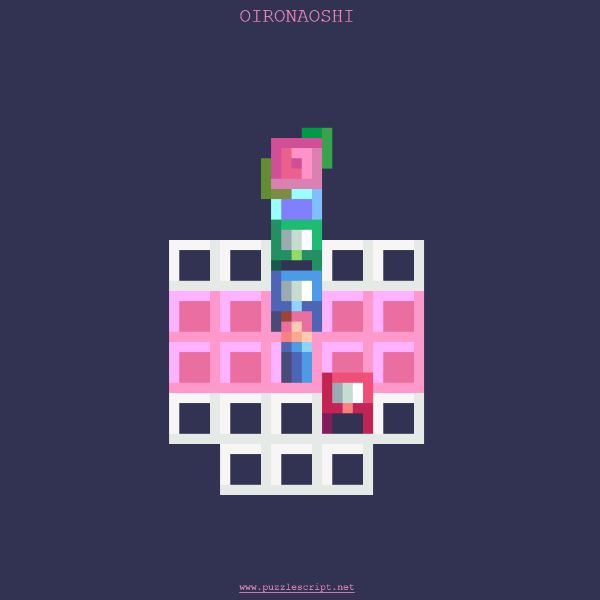
(2021) おいろなおし (OIRONAOSHI)
# Many of your previous works were created in PuzzleScript. What were the differences between working with PuzzleScript and PICO-8?
PuzzleScript is a simple game engine that only has the bare minimum you need to create puzzle games, and its greatest strength is that you can easily test out puzzle ideas without any knowledge of advanced programming. Since it only outputs into HTML, it is good for prototyping games on a conceptual level, or as a supplementary tool to help with the development of a larger project. (Of course, with patience and ingenuity, you can also make cool games! It’s free, so if you are interested in making puzzle games, please try it out!)
I got interested in making puzzle games thanks to PuzzleScript, since it is a tool that does not require any previous experience making games. Until I found PICO-8, I never imagined that a mere puzzle fan such as myself would ever choose to make a commercial game. It’s not that I chose to use PICO-8, but rather that PICO-8 gave me the chance to create Magicube.
With PuzzleScript, basic functions like undo, restart, and having everything move in a grid are already set up for you. But with PICO-8, you have to program all of that in yourself. I frequently ran into bugs and wasn’t used to dealing with them, and I lost a lot of time to doing things by trial and error and looking things up. In particular, undo and collision bugs dogged me to the end.
While PICO-8 allows you to create games in a much freer style than PuzzleScript, PICO-8 has many unique limitations. Especially, the small screen size was an obstacle to making puzzles, and I was often frustrated that I couldn’t fit in even one more square. However, depending on your point of view, these limitations can help a lot in brushing up your puzzle designs. Thinking of ways to use the same concept in a more concise layout, it was like trying to solve a creative puzzle that nobody knows the answer to, and there was a lot of value in taking on that challenge. It was a lot of work but also a lot of fun.
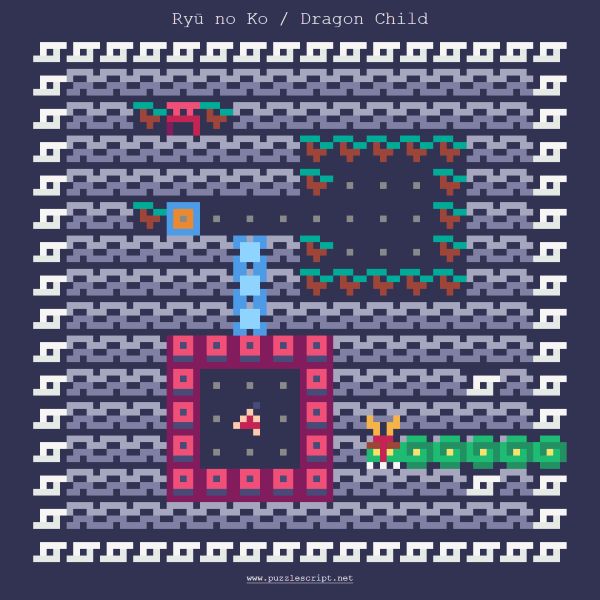
(2023) 龍の子 (Dragon Child)
# Do you have any indie games that you’d like to shout out? What do you like about them?
There is this puzzle game called Headlong Hunt that has this problem. In order to cross to the opposite island, you need to sacrifice a block, but in exchange you can get a block. In other words, exchanging one block for another doesn’t seem to have any benefit at first, but it is impossible to arrive at the answer without doing so. Once you’ve tried to solve a puzzle, a lightbulb will go off, and for me that felt like magic. I couldn’t let go of that feeling of surprise and excitement for a while afterwards.
Sitting cross-legged in these small spaces with no phony tricks, putting together ordinary mechanisms that leads to shocking results, these are the kinds of magical moments that I want to encounter. This is why I play puzzle games.
Headlong Hunt is one of those rare games that manages to be both creative and accessible at the same time, satisfying beginners who are curious about puzzle games as well as the expectations of puzzle die-hards. I encourage you to check it out!
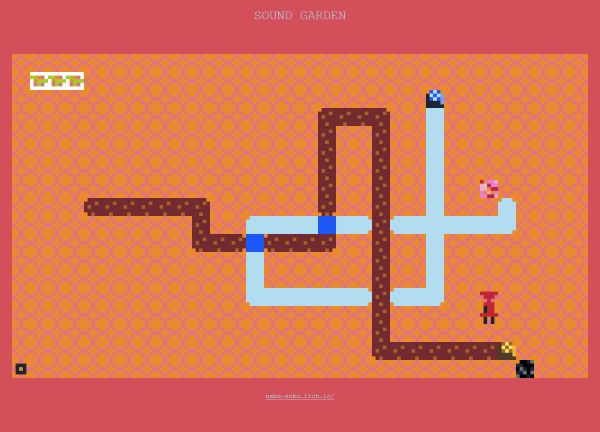
(2020) SOUND GARDEN
# Can you tell us about other games you worked on in the past?
I got a sudden urge to make a strange game, so I made a strange game with SOUND GARDEN. It is a strange game where you grow strange flowers and play strange music. For some reason it is my favorite game that I’ve made in PuzzleScript. It’s a free game, so please give it a try.
# Can you tell us about anything you are currently working on?
I am working on improving Magicube based on the feedback I’ve received.
I am very aware that some people are hoping for a Mac version. I am considering releasing it on itch.io since my PC makes it difficult to release a Mac version on Steam. Please give me a bit more time.
Also, I still have some new level ideas floating around, and if I can iron out a good number of them, I hope to update the game with these extra levels.
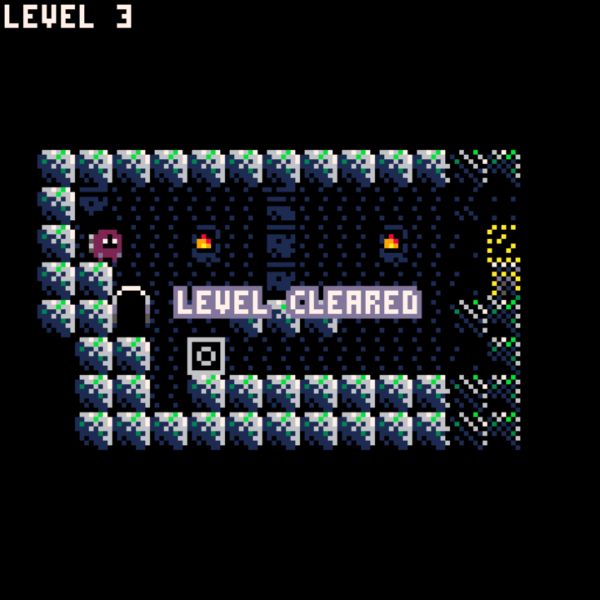
# Do you have any messages for your players?
Thanks to all of you, 2023 was an unforgettable year. Even within just the indie games market, sales have not been outstanding, but for those of us who imagined putting out a game that would be tucked away in Steam, it all seems like a miracle. Whenever I receive a review, I feel like crying as I read it over and over again.
There is no way for me to know if the excitement and surprise contained in a puzzle will bear out, so long as I am the person who created the puzzles and not the one who solves them. It was only in the instant when people played my game and said that it was fun could I finally be able to say that my puzzle game is complete. It would make me very happy if you could uncover the sparkling ideas that I found.
Thank you so much for playing!
# Thank you for sharing your thoughts with us!
日本語

(2023) Magicube
# 自己紹介してください。
道に迷っている普通の人です。この世のすみっこで気楽なパート勤めをしながら、パズルゲームを遊んだり作ったりしています。最近のたのしみは残業があった日に晩御飯で贅沢をすることです。
# ゲーム作りを始めたきっかけはなんですか。
漫画を描いたり、ギターを弾いたり、カメラを回したり、むかしからアイデアを表現することが好きで、興味を持ったことにたいして受け手のままではいられない性分でした。プログラマー向けの頭ではない自覚があったのでゲーム開発だけはないと思っていたのですが、数年前からパズルにはまり、さらにPuzzleScriptという初心者向けの手軽なゲームエンジンがあると知ったのをきっかけに、あとは必然のなりゆきでした。

(2021) みんなでGOLF!
# もしよろしければ、ご本人にとって一番好きなゲームや好きなジャンルをご紹介お願いします。
子どものころに遊んだゲームだと、「パラッパラッパー」 がお気に入りです。リズムゲームが新しかったのもあるけど、3D技術の台頭期にそれを逆手に取った大胆不敵なアートスタイルがとくに印象的でした。ゲームを買ってもらえない家だったので、当時は友達の家で断片的に体験しただけでしたが、おとなになってからも楽しかった思い出が忘れられず、続編までそろえて何度も遊びなおしました。サウンドトラックは今でも愛聴しています。
「moon」を始めとしたラブデリック系譜のゲームも大好きで、いま思うと僕にとってシンキーゲームの原点でした。最初に遊んだのは「ギフトピア」で、箱庭世界に散りばめられた謎解きを探して、観察して、考えるというユニークなアイデアに魅せられて、かたっぱしから関連作品を調べて遊びまくりました。なかでも「エンドネシア」はもういちど記憶を失くして遊びたいゲームのひとつです(ひとつだけ答えを見てしまった、くやしい!)。

# この度の「Magicube」という作品についてご紹介お願いします。
シンプルな2Dのパズルゲームです。著名人からいただいた言葉をお借りすると、
- Aliensrock: “Even level 4 will destroy you.”
- Alan Hazelden: “It’s one of those ‘level 1 is hard, level 2 is impossible’ games.”
- Jonathan Blow: “What an awful first level.”
だそうです。
# 「Magicube」を作るときに、どのようなプロセスで作成しましたか。他のゲームを作るときと何か違いがありますか。
寝ても覚めてもパズルのことを考える毎日でした。
ありがたいことに、最初のデモを公開したときに連絡をくれた方がいて、一年以上にわたってテスターとして協力してもらうことになりました。レベルを追加しては遊んでもらい、別解を修正しては遊んでもらい。もちろん意見をもらえるのはありがたかったけど、それいじょうに、つねに自分の作るパズルをたのしみにしている人がいてくれることが大きな心の支えになりました。qwafflesさん、ありがとう!

# 「Magicube」は、それぞれのステージごとに違った魅力を感じました。どのようにしてパズルを考えましたか。パズルが思いつくのはどういうときですか。
どうやって考えてるんだろう 笑。パズルづくりの大部分は、頭の中でのとりとめないにらめっこです。とくに僕の場合は、遊んで学んだ感覚的なノウハウを頼っている感じなので、いっそう無軌道になりやすく、言葉に起こして説明するのは難しいです。
ひとつ信条としてあるのは、僕にとってパズルはアイデアを届けるための舞台装置であるということです。見つけたアイデアを主役として輝かせることをいちばんに考え、難易度は結果的に決まるものという方針でデザインしています。

# 「Magicube」を作成するにあたり、最も影響を受けたものは何ですか。
プラットフォーマーを選んだのは「Recursed」(※1)への憧れからです。コアメカニックの着想は(これは意外だと思われそうだけど)「Portal」(※2)から得ました。正確には「Portal」のmod作品やカスタムレベルで見かけるテクニックに、キューブのリセット機能を利用するものがあり、僕はそれを「Portal Stories: Mel」(※3)で初めて体験したのですが、すぐに気に入りました。
最初のアイデアは、画面上のグリッドをどれでも任意に選択してブロックを配置できるパズルってどうだろう、というものでした。そこから、さすがに自由度が高すぎる。配置できるブロックが一度にひとつだけならどうか?
それだと既存のブロックが消えるのを利用できるぞ、と煮詰めるうちに記憶のひきだしの中で件の体験とリンクして、これはおもしろくなりそうだと本腰を入れる決断をしました。なので、「Magicube」のコアメカニックはじつはブロックを生みだせることではなく、消せることだと思っています。
※1: 最も頭が混乱するパズルゲームのひとつ。やろう!
※2: ゲーム史上最も有名なパズルゲームのひとつ。やろう!
※3: 最もすぐれたファンメイドゲームのひとつ。やろう!

# 「Magicube」を作成するにあたり最も挑戦したことなどはありますか。
なにもかもが挑戦でした!長期的な開発を見込むのも、本格的なゲームを作るのも初めてのことだったし、なにより、それまでの経験から独りでパズルの質と向き合う困難さを思い知らされていました。とにかく完成させることを目標にいくつか大方針を定めてモチベーションのよりどころにしました。
欲張らない:演出に凝りたい気持ちもあったけど、パズルの質を最優先にして、あとは余力が許すかぎりでと考えました。
一年かける:一年はかかるだろう、ではなく、いいパズルゲームをつくるには最低でも一年はかけなくてはならないという決意でした。じっさいは一年半かかりました。
悪くない100問より最高の50問:自分の実力と相談してそう決めました。じっさい一年半かけて50問用意するのがやっとでした。(1問だけテスターさんが作ってくれました!)
デモ制作と公開テストの実施:ゲーム開発者らしい活動と縁遠く、フィードバックを募る方法を知らなかったので、itch.ioを利用して初期段階の試遊と最終段階での公開テストを実施することにしました。公開テストの時にYouTuberの方から動画のフィードバックをいただき、とても助けられました。

# 「Magicube」は、高い難易度でありながらそこに美しさを感じました。決して偶然では正解にたどり着けないそのゲームデザインにおいて何かこだわりはありますか。
パズルを作るにあたってとくに苦心したのは、なるべく解く人の視点に立つ努力をし、難しくても向き合いやすいデザインを心がけることです。
じつをいうと、以前の僕は無駄のないことだけが美しさの条件だと思い込んで、難しさの質や解く人のストレスには無頓着でした。そんな独りよがりを反省するきっかけを与えてくれたのが「Baba Is You」と「Stephen’s Sausage Roll」(※4)です。開発中にふたつを遊びなおしたのですが、作る側の視点になって初めて気づく学びがたくさんあり、すでに実装済みだったレベルの多くを見直すことになりました。
もし「Magicube」の難しさを美しいと感じてもらえたなら、それは「Baba Is You」と「Sausage Roll」、そして熱心な忠言をくれたテスターさんのおかげです。パズルは悩めるから楽しいのだけど、悩めれば楽しいというわけではないのが、パズルづくりの難しいところだと思います。
※4:どちらも後に続くパズルゲームのデザイン哲学に大きな指針を示した伝説級のパズルゲーム。やろう!

# 「Magicube」をクリアできない人へ何かアドバイスはありますか。
もし解けないパズルに出会ったら試しに画面を閉じてみてください。
あくまで僕の個人的な経験則ですが、視覚的に物事と向き合うあいだはかえって思考の視野が狭まり、まちがった細部に囚われたまま抜け出せなくなってしまうことがあります。そこで頭に浮かべて考えるようにすると、あらためて可能性の全体像を俯瞰でき、多面的に観察する余裕が生まれます。
同じことがパズルづくりにもいえて、とくに致命的な矛盾と遭遇したときなどは、エディターとにらめっこし続けるより散歩でもしながら考えるほうがずっと改善案をひらめきやすい気がします。
よく、寝て起きたら解けるというけれど、つまりそういうことなのかも。

(2021) おいろなおし
# nebu sokuさんの作品は、PuzzleScriptで作成されたものもたくさん公開されています。今回PICO-8で作成した理由などはありますか。PuzzleScriptでの作成とPICO-8での作成ではどのような違いがありましたか。
PuzzleScriptはパズルゲームの制作に最低限必要な機能だけを備えた簡易的なゲームエンジンで、高度なプログラミングをパスして気軽に思いつきを試せるのがいちばんの強みです。そもそもHTML版の出力にしか対応していないこともあって、どちらかというと構想段階の試作や本命の開発を支援する補助的な用途に適したツールといえます。(もちろん、根気と工夫しだいでかっこいいゲームが作れます!無料なので、パズルづくりに興味のある人はぜひ触ってみてください!)
僕がパズルづくりに親しむようになったのは、PuzzleScriptというゲーム開発の経験値を問わない手段があったおかげです。PICO-8に出会うまでは、まさか自分のようなただの一パズルファンが商用ゲームを作ろうと思いたつことになるなんて想像もしていませんでした。僕がPICO-8を選んだのではなく、PICO-8が僕に「Magicube」を作るチャンスを与えてくれたというのが当たっています。
PuzzleScriptだと、アンドゥ、リスタート、グリッドベースの挙動といったパズルゲームの基本的な機能がお膳立てされていますが、PICO-8ではすべてのプログラムを自分で組む必要があります。慣れないうちはバグが頻発し、試行錯誤や調べものに多くの時間を奪われました。とくにアンドゥとコリジョンのバグには最後まで泣かされました。
PuzzleScriptよりずっと自由なスタイルのゲームが作れる反面、PICO-8はPICO-8で個性的な制限がたくさんあります。とくに画面サイズの小さいことはパズルづくりの障害になりやすく、たりない1マスに悩まされることが何度もありました。ただ、考え方によっては制限はパズルをブラッシュアップするための強い味方でもあります。同じコンセプトをより簡潔なレイアウトで実現する方法を考えるのは、誰も答えを知らない創造的なパズルに挑んでいるようなやりがいがあって、たいへんだけどとても楽しかったです。

(2023) 龍の子
# おすすめのインディーゲームやパズルゲームはありますか。おすすめのポイントも教えてください。
「Headlong Hunt」というパズルゲームにこんな問題があります。向かいの島に渡るのにブロックを一個犠牲にしないといけないのだけど、その代わりに手に入るのがこれまたブロック一個。つまり1と1の交換という一見なんの益もない手順なのに、それをしないで答えにたどりつくことはできない。解けてみるとなるほど理に適ったことなのですが、僕にはそれが魔法のように感じられ、驚きと感動の余韻からしばらく抜け出すことができませんでした。
何のまやかしもない小さな空間に不可能があぐらをかいていたり、ありふれた仕組みの組み合わせから信じられないような驚きが生まれたり、僕はそんな魔法のような瞬間に出会いたくてパズルを遊んでいるのだと思います。
「Headlong Hunt」は創造性と親しみやすさを同時に追究する困難をやり遂げたたぐいまれなゲームのひとつで、ビギナーの好奇心とパズルオタクの期待の両方に応えてくれます。ぜひ遊んでみてください!

(2020) SOUND GARDEN
# もしよろしければ、これ以外に作成したゲームやその他のプロジェクトについてご紹介お願いします。
とつぜん変なゲームが作りたくなって作った「SOUND GARDEN」という変なゲームがあります。変な花を育てて変な音楽を奏でる変なゲームです。なにげにPuzzleScriptで作ったなかでいちばん気に入っています。無料で遊べる変なゲームなのでぜひ遊んでみてください。
# 今はどのようなプロジェクトを進めていますか。今作っているゲームなどをもしよろしければご紹介お願いします。
今はいただいたフィードバックを参考に、見つかった欠点の改善に努めています。
Mac版を期待する声があることも重々承知しています。PC環境の問題からSteamでの対応は難しいため、itch.ioでの販売を検討しているところです。もう少し時間をください。
それと、今も新しいレベル案が浮かぶことがあって、もしまとまった数になったらエクストラダンジョンとして追加のアップデートができるといいなと思っています。

# プレイヤーの皆さんへ何かメッセージがあれば一言お願いします。
2023年はみなさんのおかげで忘れられない年になりました。インディーゲーム市場に限っても決して目立った売り上げではないですが、Steamの片隅に埋もれる未来を想像していた身にはなにもかもが奇跡のようです。レビューを受けとるたび、泣きそうになりながら何度も読み返しました。
パズルに込めた感動や驚きが実るかどうか、作った本人が解く側になれないいじょう、それを知るすべはありません。遊んでもらって、おもしろかったと言ってもらえたその瞬間、初めてパズルゲームは完成を宣言できるのだと思っています。僕が見つけたアイデアのきらきらを受けとってもらえたならとてもうれしいです。
遊んでくれて、ありがとう!
# この度はインタビューにご協力いただき誠にありがとうございます。
